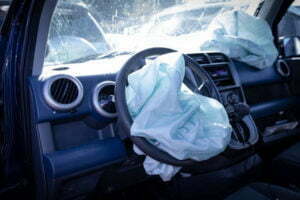What to Know About the Recent Takata Airbag Recall
June 24, 2021 in Product Liability
Tens of millions of vehicles utilizing Takata airbags are under recall. According to the National Highway Traffic Safety Administration (NHTSA), long-term exposure to high heat and humidity can cause these airbags to explode when deployed. In some instances, these explosions have caused injuries and even deaths. Below, the New Jersey and New York personal injury attorneys at Sullivan Papain Block McManus Coffinas & Cannavo P.C. provide further information about the recall.
Overview of the Takata Airbag Recall
In what the NHTSA has dubbed “the largest and most complex safety recall in U.S. history,” 19 different automakers have called to replace airbags on certain models.
The airbags, located in most vehicles on the front driver and passenger sides, are manufactured by major parts supplier Takata. The now-recalled airbags were installed in cars mostly from model years 2002 through 2015. The airbag inflator was the faulty part that led to the Takata airbag recall.

Airbags are one of the most important safety features in an automobile. When they are defective, they can cause harm to passengers.
Airbag Inflators in Takata Airbags
The inflator is a metal cartridge loaded with propellant wafers that inflates the airbag when triggered. When an accident occurs, sensors in the automobile send signals to the airbag’s control unit. The control unit then determines the severity of the impact and whether or not to deploy the airbags.
If the control unit deploys the airbags, a signal is sent to the inflator. Inside the inflator, a small spark ignites the main fuel or propellant. Through an instantaneous chemical reaction, the gasses from the ignited propellant wafers forcefully inflate the vehicle’s airbags.
According to investigations done by the NHTSA, the root cause of the problem is airbags that use ammonium-nitrate-based propellant without a chemical drying agent. When exposed to high heat or humidity over long periods of time, the faulty inflator in Takata airbags can explode when deployed. This results in metal shards being projected throughout the passenger cabin.
Injuries and Vehicle Recalls
To date, there have been 19 deaths and more than 400 injuries in the U.S. according to Consumer Reports. Due to the international use of Takata Airbags, the NHTSA reports at least 28 deaths worldwide.
Through a variety of announcements, the Takata airbag recall has grown to include 67 million airbags in more than 42 million vehicles in the United States. A full timeline of the recalls as well as an exhaustive list of known vehicles impacted is available here.
Due to the high volume of recalls and current supply chain disruption, the NHTSA has issued these recalls in waves, prioritized by risk. The models that pose the highest level of risk to consumers have been placed under a stop-driving order.
Most recently, the NHSA flagged cars made by Honda, Acura, Ford, Mazda and BMW as extremely high risk. This included certain 2001 to 2003 Honda and Acura models containing “alpha” airbags as well as the 2006 Ford Ranger and Mazda B-series pickup trucks. Also included are the 1999 BMW 323i and 328i. The NHTSA advises that owners of these vehicles do not drive them and seek immediate repairs.
For the millions of vehicles that have been recalled but not placed under a stop-driving order, the NHTSA has prioritized delivery of parts to models and areas with the highest concentration of Takata incidents.
Determining if Your Vehicle is Impacted by Takata Airbag Recalls
Because the recalls have included millions of vehicles, it is important to determine if your vehicle is affected. Whether a manufacturer independently conducts a safety recall or if the NHTSA orders one, the manufacturer is required to file a public report describing the safety defect or noncompliance. Additionally, manufacturers are required to notify owners by mail within 60 days of notifying the NHTSA about a recall.
If you are concerned about your vehicle and whether or not it is included in the wave of Takata airbag recalls, visit NHTSA’s website and enter your vehicle’s identification number into their Safety Issues & Recalls tool.